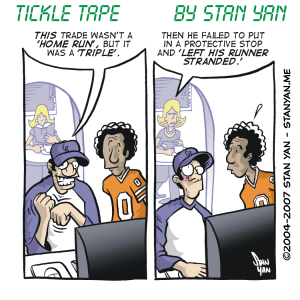Trading is a challenging business. Only the most skilled traders can make a living as an active, full-time trader. Trading experts suggest that novice traders approach trading the same way that students pursue their vocation in professional school, which requires a resolute dedication to hone their skills in order to move to the top of their field. The seasoned, professional trader has rare and valuable skills, like those of a lawyer or a doctor. You have to limit your social life and focus on developing your skills if you want to be at the top of your class. Think of the interns and residents on “E.R.” or the law students on the “Paper Chase.” They focused all their efforts on learning about their profession, even if it meant sacrificing their social life. It required life with little balance between work and pleasure. Is it a good idea? It depends on how much happiness you want in your life.
In a recent interview in the “APS Observer,” Professor Laura King, a psychologist at the University of Missouri, Columbia, was asked how graduate students could make the most of the current lives. She said, “Enjoy the process as much as you can and try to maximize your positives by readily dedicating yourself to the goals that are likely to be rewarded.” This advice is true for trading as well as for students in graduate and professional schools. It’s vital that you enjoy the process of trading, but should it be your raison d’être? Maybe not. Professor King suggests, “I am not one who thinks that graduate school is not a time to have a real life. You may have to keep it a secret, but have a life.”
Many novice traders work under the assumption that because they’re putting their money on the line to pursue trading, they should give it they’re all. Is it necessary? A study we conducted at Innerworth suggests that it is not. We asked a group of traders to fill out a questionnaire regarding their emotional mood. We divided the sample into happy and unhappy traders and compared them. Compared to unhappy traders, who reported a tendency to feel disappointed, frustrated, and discouraged, happy traders reported that they enjoyed the process of trading. They liked the intellectual challenge trading provided.
They enjoyed learning about how companies made a profit. They enjoyed learning about new investment strategies and enjoyed learning about how people made money in the markets. These responses are consistent with Professor King’s suggestion to “enjoy the process.” When asked if they allowed their personal relationships to suffer as a result of devoting too much time and energy to trading, the answer was “No.” Happy traders were clearly dedicated to honing their trading skills and enjoyed doing so, but they didn’t allow their relationships to suffer as a result of their dedication. There is a valuable lesson to learn: Pursue trading earnestly, but also seek out psychological balance. Don’t think that trading must be your whole life. Spend time with family and friends. That’s what happy traders do.

